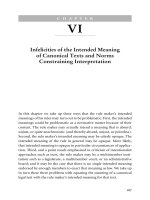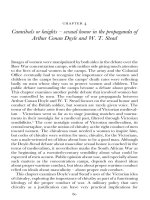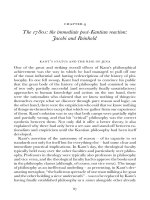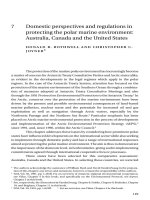1801-1807 - the other post-Kantian Jacob Friedrich Fries and non-Romantic Sentimentalism
Bạn đang xem bản rút gọn của tài liệu. Xem và tải ngay bản đầy đủ của tài liệu tại đây (131.14 KB, 13 trang )
–: the other post-Kantian:
Jacob Friedrich Fries and non-Romantic Sentimentalism
Although Romanticism dominated the development of immediate
post-Kantian thought (after Reinhold), there were other, equally im-
portant interpretations afoot of where to take Kant. By the turn of the
century (), Jacobi’s influence, always large in this period, had al-
ready led to another, very different, appropriation of Kant in the per-
son of Jacob Friedrich Fries (–). About the same age as the
other post-Kantians at Jena (Schelling, Hegel, Schleiermacher, Novalis,
and H¨olderlin), Fries only managed to formulate his own views about
a decade later than those working in the aftermath of the initial tumult
surrounding Fichte and the early Romantics. Like many of them (for ex-
ample, Niethammer, H¨olderlin, Schelling, Hegel, and Schleiermacher),
he too had first studied theology before moving to philosophy. Having
been raised and educated in a famous Pietist community of the Herrnhut
(Moravian) Brethren, he was sent to a Pietist boarding school in Niesky
for his adolescent years. In , he went to Leipzig to study philosophy,
where he apparently came under the influence of Jacobi’s work; in ,
he studied for a year in Jena, leaving for while to be a private tutor, only
to return to Jena at the end of (around the same time Hegel arrived
in Jena). After , he and Jacobi became friends, and Jacobi remained
an admirer of Fries’s work.
Fries’s own career was rather checkered, and he and Hegel developed
a distaste for each other at Jena that spanned the lifetimes of both men,
leading both to denounce each other in private and public in a variety
of ways for their entire lives. Fries nonetheless established his views as
one of the major options in the post-Kantian debate, and, in many ways,
Fries, Schelling, and Hegel contended for preeminence in the German
philosophical scene during the lives of all three men. Like many other
men of his generation, Fries found his academic job prospects rather
paltry (although he was far more successful at first than Hegel), and
he bitterly resented others attaining any of the few positions available
Part II The revolution continued: post-Kantians
( just as Hegel, and others, bitterly resented Fries’s own acquisition of any
of the few positions that were available).
Fries was quite industrious and, starting around , published vol-
ume after volume laying out his own system of post-Kantian thought. His
own entry into the scene came in with the publication of Reinhold,
Fichte, Schelling, which sharply criticized all three thinkers and established
his own views as being markedly different from all the other versions of
“idealism” being touted around Jena at the time. (In some ways, that
book can be seen as his own riposte to Hegel’s first book in , The
Difference Between Fichte’s and Schelling’s Systems of Philosophy.) In the same
year, he published his Philosophical Doctrine of Right and Critique of All Positive
Legislation,in his first presentation of his complete system as
Knowledge, Faith, and Portent, and in his multi-volume NewCritique of
Reason, which he then revised and republished later in – as the
Newor Anthropological Critique of Reason. His position, however, was already
set out in its basic formby with the publication of Reinhold, Fichte,
Schelling, and, in his other writings, he tended to repeat himself quite a
bit.
Fries nonetheless achieved a lasting influence by his rewriting of
the Kantian system in terms of his peculiar combination of religious
piety, defense of Newtonian mathematical science, and political views
that were at once republican, liberal, and anti-Semitic. To many, Fries
was the ideal counterweight to those who could not abide the influence of
the post-Kantian idealists but who did not want to return to pre-Kantian
metaphysics.
Like many in the debate at the time, Fries was concerned to see what
could be salvaged fromKant’s achievement if one were to drop the notion
of the unknowable thing-in-itself; and, taking over Jacobi’s main point,
he was convinced that the “foundation” of the Kantian enterprise had
to rest on some kind of immediate, non-inferentially known “faith” that
itself could only be disclosed in “feeling” and not by reason alone. In
Reinhold, Fichte, Schelling, he made those views explicit and used them to
declare the whole post-Kantian idealist movement to be a failure. Fries
accused all three of the post-Kantian system builders of committing
various elementary logical blunders in the way they tried to “improve”
Kant (and in his later writings even going so far as to admit that some
of those blunders were due to Kant himself ).
See J. F. Fries, Reinhold, Fichte, Schelling (Leipzig: August Lebrecht Reinicke, ); Philosophische
Rechtslehre und Kritik aller positiven Gesetzgebung mit Beleuchtung der gew¨ohnlichen Fehler in der Bearbeitung
des Naturrechts ( Jena: Mauke, ; photoreprint Leipzig: Felix Meiner, ); Wissen, Glaube, und
Ahnung (translated as Knowledge, Belief and Aesthetic Sense (ed. Frederick Gregory, trans. Kent Richter)
(Cologne: J¨urgen Dinter, ).
–: Jacob Friedrich Fries
Fries’s own solution is easily confused with Kant’s, since his writ-
ings in his Jena period tended to be more or less just restatements of
Kant’s views purged of much of Kant’s argumentation. However, he
was never a pure Kantian, and he blended into his reception of Kant
a mixture of empirical realism, a “phenomenological” investigation of
consciousness (not in Hegel’s sense of “phenomenology” but something
somewhat closer to that advocated by Edmund Husserl in the twenti-
eth century), and a Jacobi-inspired appeal to immediacy and feeling to
provide foundations for religious faith. Fries was convinced that Kant’s
doctrine of the antinomies was perhaps the crucial error in Kantian doc-
trine, which, in turn, partially accounted for the fatally mistaken path
on which Reinhold, Fichte, and Schelling (and later Hegel) found them-
selves. Kant had simply not shown, so Fries insisted, that the application
of reason to things-in-themselves resulted in irresolvable contradictions.
Fries was thus among the first to advise dropping the largest part of Kant’s
monumental Critique of Pure Reason, focusing instead on combining the
arguments in the Critique found in the section labeled “transcendental
analytic” with those in the Metaphysical Foundations of Natural Science.
On Fries’s view, Fichte had only made matters worse by appropriating
Kant’s doctrines of the antinomies into a so-called method for showing
how the “I” both posits the “Not-I” and then supposedly resolves the con-
tradiction that it put there. In Fichte’s thought, “an error was introduced
into his argumentation through the confounding of the concept of differ-
ence with that of contradiction ...each synthesis is supposed to consist in
the dissolving of a contradiction ...and in that way ...[it] leads to a naive
play of words,” not a real argument.
It is indeed, “laughable,” so Fries
claimed, “how these concepts [used by Fichte] are, through the words
analytic and synthetic, here equated with the Kantian concepts.”
For
Fries, Fichte’s so-called Wissenschaftslehre pretended to end the possible
regress of reason-giving by appealing to a principle that was supposed to
be “certain” but which was actually nothing of the sort; it was thus only
a ludicrous attempt to pull the wool over people’s eyes by pretending
to “deduce” everything when in fact nothing was being deduced at
all. To Fries, Schelling’s only contribution was to compound Fichte’s
errors.
Nonetheless, so Fries argued, although neither Fichte nor Schelling
was the answer, the problemthat Jacobi had uncovered – that our jus-
tifications have to come to an end somewhere – was genuine. For Fries,
what was wrong with Jacobi’s solution was that he thought that only his
Fries, Reinhold, Fichte, Schelling,p..
Ibid.,p..
Part II The revolution continued: post-Kantians
“mortal somersault,” the salto mortale – a “leap of faith” – could possibly
suffice to provide the required stopping point, and thus he arrived at
his supposed stopping point far too quickly. Jacobi quite unwittingly had
only described the structure of subjective knowledge: a series of “mediate”
(inferentially based) cognitions that are all ultimately based on some
“immediate” cognition, which, as Kant saw, had to be “intuitions.” The
real issue, though, was whether our systemof knowledge (as we might de-
scribe that structure within consciousness) has any “truth” to it, whether it
corresponds to things-in-themselves, or whether the ultimate “intuitions”
on which knowledge rests are only “appearances” (in the sense of
illusions). So Fries concluded, this description of the structure of empirical
knowledge is equivalent to what Kant must have meant (or at least should
have meant) when he characterized himself as an “empirical realist”
with regard to empirical knowledge. Within the realm of appearance
(Erscheinung), we have genuine knowledge of empirical objects as based
on immediate intuitions. We cannot, however, conclude from that that
the systemof this empirical knowledge has any “transcendental truth”
(as Fries puts it), that is, that it matches up to things-in-themselves as they
exist apart fromthe conditions under which they can be experienced.
The answer to that question, of course, is that they cannot. We can
only know things-in-themselves under the conditions that govern our ex-
perience of them, and those conditions are irrevocably subjective, bound
up with the structure of the human mind. The solution to the dilemma
lies in working out further Kantian distinctions, particularly in Kant’s
striking claimthat he (Kant) “found it necessary to deny knowledge,in
order to make room for faith.”
Fries finesses that distinction by limiting
knowledge (Wissen, in his sense) to appearances of objects in space and
time and claiming that it is only belief, faith (Glauben) that connects us to
the realmof things-in-themselves, which, as he puts it, must be identified
with the “eternal,” to distinguish themfromthe things of the temporal,
finite world we necessarily experience. (As standing completely outside
of time, which is only a subjective condition of knowledge, things-in-
themselves are “eternal.”) To “save freedomapart fromnature,” Fries
claimed, requires us to conceive of freedom as “an exemption from the
laws of this quantitative context, [to be] a law of existence that is not the
law of nature. This will alone be demonstrated in nature’s being only
the formof appearance, the formof the finite, in a finite in which, how-
ever, the eternal appears whose original being is a free being.”
(He even
notes that “in the philosophical application of this distinction we could
Critique of Pure Reason, xxx.
Fries, Reinhold, Fichte, Schelling,p..
–: Jacob Friedrich Fries
have spared ourselves much contention if we had started with the dif-
ferentiation between appearance and being-in-itself as it commonly ap-
pears among the people, for example in the catechism, or at least in most
prayer books.”
) For Fries, the “Kantian paradox” is thus not really an
issue on his horizon; for him, the issues about freedom have to do with
the worry about freedomand nature, not about self-legislation.
Relying on Kant’s claimabout the practical need to presuppose free-
dom (as opposed to the theoretical impossibility of ever demonstrating
it), Fries concludes that such “belief (faith) in the eternal, and at the same
time in the reality of the highest good, is the primary presupposition of
every finite reason.”
We must believe (or have “faith,” Glauben) in the re-
ality of the “eternal” (of things-in-themselves), even though we cannot be
said to “know” (Wissen) it; “belief ” in things-in-themselves (the eternal)
is thus something like a presupposition of practical reason. However, he
gives that conclusion a twist that Kant would never have given it: there
is no logical contradiction between the unconditional demands of duty
and the conditional, sensible facts of our desires, there is only a “conflict
of ends,” which is resolved by assuming God and immortality on the
basis of the “purposefulness of nature.”
These are “Ideas” in an attenu-
ated Kantian sense, since they are views of the “whole” of being-in-itself
that cannot be given in intuition; instead, they are given to us by our
“concepts,” and they are related to the limited world of nature through
a kind of Ahnung, a vague “supposition,” a “portent” of the way the total-
ity of things-in-themselves are, which is itself not a cognitive operation –
indeed, it is, according to Fries, a “feeling devoid of intuition or concept.”
Fries identifies nature more or less with the Kantian description of it
as matter in motion, as something to be explained mathematically. Any
true Naturphilosophie is therefore to be identified more or less with the
one advocated by Kant (at least in the first Critique and the Metaphysical
Foundations of Natural Science – Fries also himself developed a speculative
philosophy of nature that went far beyond what Kant said, which we
cannot go into here.)
Fries reserved a particular dislike for Schelling’s
Fries, Knowledge, Belief and Aesthetic Sense,p.. To this end, Fries offers what can only be described
as an unconvincing mixture of Kant’s and Jacobi’s arguments for this conclusion, having to do
with how the “unconditioned” nature of the totality of things-in-themselves is incompatible with
the conditions under which they might be given; the world of things-in-themselves is unlimited,
whereas our own experience is of bounded, limited things in space and time.
Fries, Knowledge, Belief and Aesthetic Sense,p..
Ibid.,pp.–.
Ibid.,p. (italics added by me).
The details of Fries’s philosophy of nature are admirably laid out in Bonsiepen, Die Begr¨undung ...,
pp. –. Bonsiepen’s study is also the most thorough and certainly the best overall account
of Fries’s epistemology to date.









